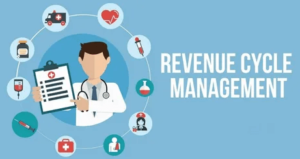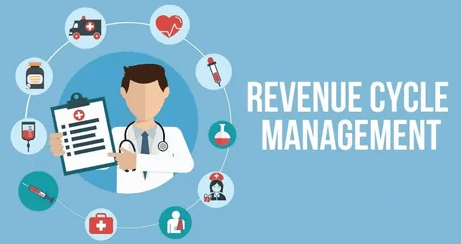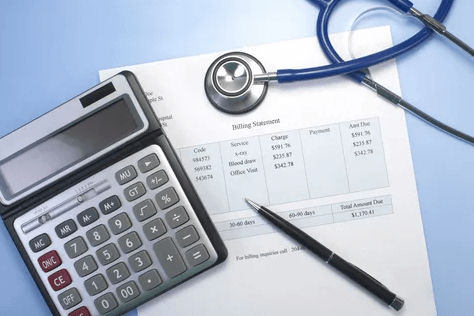Streamlining Healthcare Revenue Cycle Management for Better Financial Health
Introduction to Healthcare Revenue Cycle Management (RCM)
Healthcare Revenue Cycle Management (RCM) is a crucial operational framework within healthcare institutions that ensures effective financial processes. It encompasses the entire patient care journey, from registration to claims processing, payment collection, and revenue generation. RCM is pivotal in optimizing revenue streams, enhancing financial stability, and maintaining smooth healthcare operations. It involves patient registration, coding, billing, claim submission, and reimbursement tracking. By managing these components cohesively, RCM helps healthcare providers navigate complex billing systems, reduce claim denials, enhance the patient experience, and improve the organization’s financial health.
Management (RCM) is a crucial operational framework within healthcare institutions that ensures effective financial processes. It encompasses the entire patient care journey, from registration to claims processing, payment collection, and revenue generation. RCM is pivotal in optimizing revenue streams, enhancing financial stability, and maintaining smooth healthcare operations. It involves patient registration, coding, billing, claim submission, and reimbursement tracking. By managing these components cohesively, RCM helps healthcare providers navigate complex billing systems, reduce claim denials, enhance the patient experience, and improve the organization’s financial health.
This blog provides valuable insights into optimizing Healthcare Revenue Cycle Management (RCM), covering its significance, process overview, and strategies for better financial health in healthcare institutions.
Challenges in the Current RCM Landscape
In the current Healthcare Revenue Cycle Management (RCM) landscape, several challenges pose significant hurdles to the efficiency and effectiveness of revenue-related processes. Common bottlenecks and inefficiencies are paramount. These bottlenecks often emerge at various revenue cycle stages, such as patient registration, coding errors, claim submission, and denial management. These issues can lead to delayed reimbursements, increased administrative costs, and strained patient-provider relationships.
Moreover, outdated processes amplify these challenges, adversely affecting financial health and patient experience. Outmoded manual processes and disjointed systems hinder the seamless flow of information, leading to data inaccuracies, redundant tasks, and delayed payments. This strains staff resources and exacerbates the risk of billing errors and claim denials.
The repercussions extend to the patient’s experience as well. Lengthy and confusing billing processes caused by outdated systems can result in patient frustration and confusion. Patients may need help understanding their bills, leading to inquiries and claims that consume administrative time and resources.
These challenges impede healthcare institutions’ financial stability and diminish patient care quality. Addressing these issues requires comprehensively integrating modern technologies, streamlined workflows, and patient-centric strategies. Healthcare organizations can optimize their revenue cycles, enhance financial health, and improve patient experience by identifying and tackling common bottlenecks while modernizing processes.
Integration of Technology and Automation
Integrating technology and automation holds immense potential to revolutionize Healthcare Revenue Cycle Management (RCM) by enhancing healthcare institutions’ efficiency, accuracy, and overall financial health.
Electronic Health Records (EHR) and Practice Management Systems:
Electronic Health Records streamline patient data management, facilitating accurate coding and billing. Integrated Practice Management Systems automate appointment scheduling, claims processing, and payment tracking, reducing human errors and administrative burdens.
AI and Machine Learning for Predictive Analytics:
AI-driven tools analyze historical data to predict claim denials, enabling proactive measures to prevent them. Machine learning algorithms identify patterns in billing data, aiding in accurate coding, reducing errors, and optimizing reimbursement processes.
Fraud Detection and Prevention:
Automation helps identify potential fraudulent activities by monitoring billing patterns and claim data. AI algorithms can flag irregularities for further investigation, safeguarding financial health and reputation while minimizing revenue loss.
Enhancing Patient Engagement and Education
Enhancing patient engagement and education is pivotal in Healthcare Revenue Cycle Management (RCM) to foster transparent communication and empower patients regarding billing processes. By providing accessible resources that explain billing details, insurance coverage, and cost estimates, healthcare institutions can mitigate patient confusion and frustration. Transparent billing practices improve patient satisfaction and reduce the likelihood of billing disputes and inquiries, thereby saving administrative time and resources.
engagement and education is pivotal in Healthcare Revenue Cycle Management (RCM) to foster transparent communication and empower patients regarding billing processes. By providing accessible resources that explain billing details, insurance coverage, and cost estimates, healthcare institutions can mitigate patient confusion and frustration. Transparent billing practices improve patient satisfaction and reduce the likelihood of billing disputes and inquiries, thereby saving administrative time and resources.
Engaging patients through clear communication channels builds trust, strengthens the patient-provider relationship, and contributes to a positive overall experience. This, in turn, supports the healthcare organization’s financial health by minimizing billing-related complications and enhancing operational efficiency.
Optimizing Coding and Documentation
Optimizing coding and documentation plays a pivotal role in Healthcare Revenue Cycle Management (RCM) by ensuring accurate billing, reducing claim denials, and ultimately improving financial health for healthcare institutions.
Accurate Medical Coding:
Precise medical coding translates complex patient diagnoses, procedures, and treatments into standardized codes. Accurate coding not only aids in correct billing but also prevents claim rejections and delays, ensuring timely reimbursement.
Compliant Documentation Practices:
Thorough and compliant documentation of patient encounters is essential for supporting billed services. Clear and detailed medical records help substantiate claims, reducing the risk of denials and disputes while enhancing transparency.
Staff Training and Education:
Comprehensive training for medical coders and healthcare providers is crucial to understanding coding guidelines, documentation requirements, and updates in medical coding systems. Proper training minimizes errors and ensures compliance.
Regular Audits and Quality Checks:
Conducting routine audits and quality checks on coding and documentation practices helps identify errors and discrepancies. Timely corrective measures can be taken to rectify issues, resulting in accurate billing and a lower likelihood of audits or penalties.
Efficient Claims Processing and Revenue Recovery
Efficient claims processing and revenue recovery are essential to successful Healthcare Revenue Cycle Management (RCM). Streamlining the claim submission process, promptly addressing claim denials, and implementing effective revenue recovery strategies all contribute to optimizing financial health. Swiftly resolving denied claims through thorough analysis and appropriate follow-up actions prevents revenue leakage. Automation tools and proactive denial management techniques enhance efficiency and maximize revenue recovery. Healthcare institutions can improve cash flow, minimize revenue loss, and maintain a robust financial foundation by focusing on efficient claims processing and diligent revenue recovery efforts.
Data Analytics for Informed Decision-Making
Data analytics is pivotal in Healthcare Revenue Cycle Management (RCM) by providing insights for informed decision-making. By analyzing billing data, patient demographics, reimbursement trends, and claim denials, healthcare institutions comprehensively understand their financial performance. These insights enable proactive strategies to optimize revenue streams, reduce costs, and enhance overall financial health. Data-driven insights also identify areas for process improvement, guiding coding, documentation, and claims management adjustments. Through data analytics, healthcare organizations can make informed decisions that drive operational efficiency, increase revenue collection, and ensure sustainable financial well-being in an evolving healthcare landscape.
Conclusion and Future Outlook
In conclusion, streamlining Healthcare Revenue Cycle Management is vital for improved financial health. Embracing technology, patient engagement, accurate coding, and data analytics enhance efficiency. Addressing challenges and adopting proactive strategies positions healthcare institutions for a more resilient future, marked by optimized revenue, reduced costs, and enhanced patient experiences. Integrating innovative practices and ongoing adaptation will be vital to sustaining financial well-being and providing quality care as healthcare evolves.








